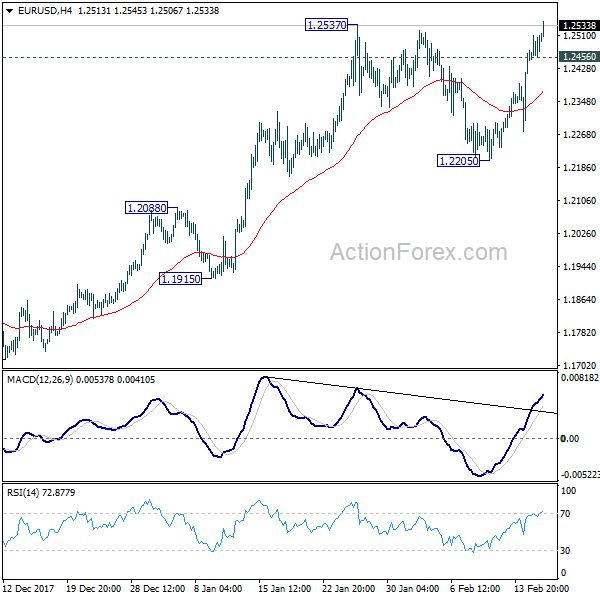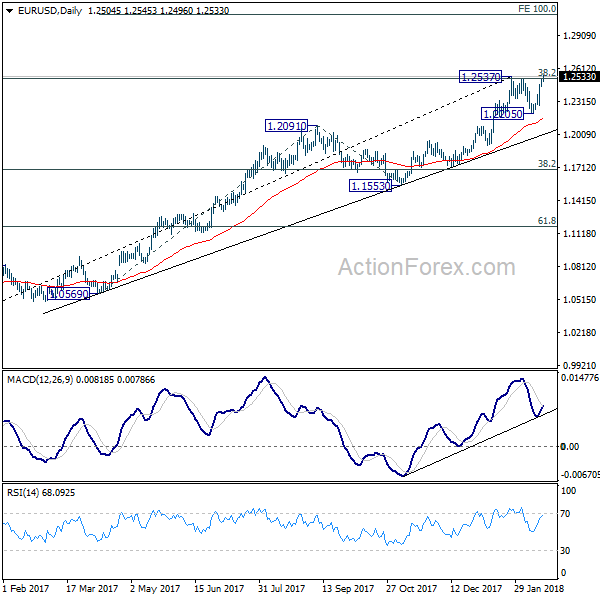Dollar suffers renewed selloff in Asian session with EUR/USD finally taking out 1.2537 near term resistance. The development could trigger more broad based weakness in the greenback before the weekly close. Elsewhere in the currency markets, Yen remains the strongest one for the week after Haruhiko Kuroda's nomination as BoJ Governor again is finally confirmed. Euro is trading as the second strongest for the week and that helps keep EUR/JPY resilient above 132 handle. Dollar and Canadian Dollar are the two weakest ones. Aussie closely follow as the third weakest after RBA Governor Philip Lowe reiterated the neutral stance.
RBA Lowe: No strong case for near term hike
RBA Governor Philip Lowe told the parliament today that the timing of any change in interest rate will "depend upon the extent and pace of progress that we make in reducing the unemployment rate and having inflation return to target." And, "as things currently stand, we expect that progress to be steady, but to be only gradual." Therefore, "the reserve bank board does not see a strong case for a near-term adjustment of monetary policy."
Regarding the job market, Lowe said that "we don't expect a repeat of these very strong outcomes in 2018, but we do expect employment growth to be fast enough to see a further gradual reduction in the unemployment rate." And, "the unemployment rate, though, is likely to remain above conventional estimates of full employment in Australia for some time."
For inflation, Low expected "wage growth to pick up as the labor market strengthens further." But, "the pick-up, though, is likely to be gradual." He added that "this increase in wage growth and the more general reduction in spare capacity in the economy are expected to contribute to inflation picking up as well. But to continue the theme, this pick-up, too, is expected to be only gradual."
NZ manufacturing expands at faster pace
Business NZ manufacturing PMI rose to 55.6 in January, up from 51.2, indicating faster expansion. BNZ Senior Economist Craig Ebert noted that "while the NZ PMI has led the world for the last five years, the global PMI has now pretty much caught up. This suggests the international investment cycle is clicking into place and promises to self-sustain the global economic expansion. This should be good for manufacturing industries, New Zealand included."
Kuroda nomination finally confirmed
In Japan, it's finally confirmed that Haruhiko Kuroda is nominated by the government to server a rare second term as BoJ Governor. BoJ executive director Masayoshi Amamiya and Waseda University professor Masazumi Wakatabe are nominated as the to deputies. Hiroshi Nakaso and Kikuo Iwata will be replaced as deputies when their terms expire in mid-March. With the ruling coalition holding a majority, the nominations will be easily approved by both houses.
Looking ahead
UK retail sales is the only feature in European session. Canada will release manufacturing sales and international securities transactions. US will release import price, housing starts and building permits, as well as U of Michigan sentiments.
EUR/USD Daily Outlook
Daily Pivots: (S1) 1.2464; (P) 1.2487 (R1) 1.2529
EUR/USD's rally continues today and breach of 1.2537 resistance suggests that larger up trend is resuming. Intraday bias stays on the upside. Sustained trading above 1.2537 will confirm and page the way to 100% projection of 1.0569 to 1.2091 from 1.1553 at 1.3075. However, break of 1.2456 minor support will indicate rejection from 1.2537 and turn bias back to the downside for 1.2205 support.
In the bigger picture, key fibonacci level at 38.2% retracement of 1.6039 (2008 high) to 1.0339 (2017 low) at 1.2516 remains intact. Hence, rise from 1.0339 medium term bottom is still seen as a corrective move for the moment. Rejection from 1.2516 will maintain long term bearish outlook and keep the case for retesting 1.0039 alive. However, sustained break of 1.2516 will carry larger bullish implication and target 61.8% retracement of 1.6039 to 1.0339 at 1.3862.


